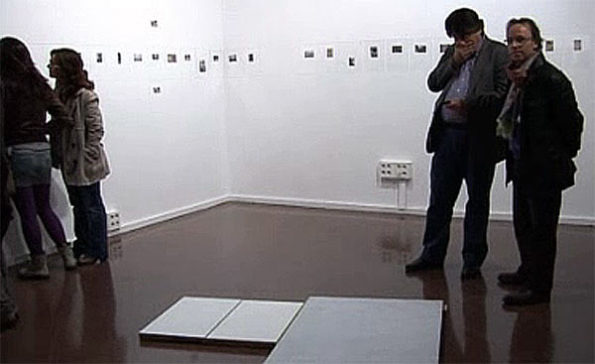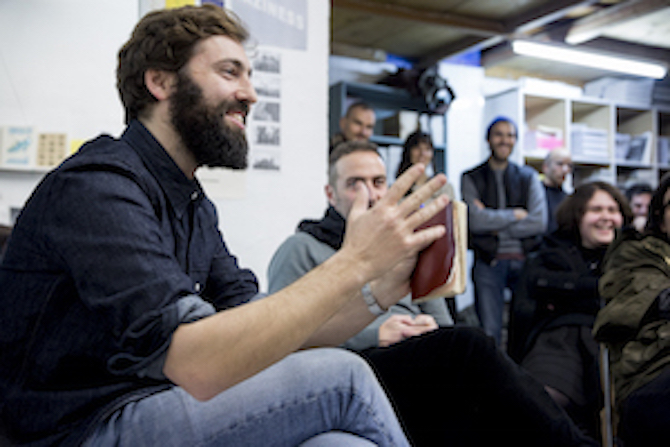Search
To search for an exact match, type the word or phrase you want in quotation marks.
A*DESK has been offering since 2002 contents about criticism and contemporary art. A*DESK has become consolidated thanks to all those who have believed in the project, all those who have followed us, debating, participating and collaborating. Many people have collaborated with A*DESK, and continue to do so. Their efforts, knowledge and belief in the project are what make it grow internationally. At A*DESK we have also generated work for over one hundred professionals in culture, from small collaborations with reviews and classes, to more prolonged and intense collaborations.
At A*DESK we believe in the need for free and universal access to culture and knowledge. We want to carry on being independent, remaining open to more ideas and opinions. If you believe in A*DESK, we need your backing to be able to continue. You can now participate in the project by supporting it. You can choose how much you want to contribute to the project.
You can decide how much you want to bring to the project.

Lúa Coderch takes a look at the past and some family memories that, without any parallel information, are slowly losing their capacity as references. Ideologies, places, secrets and emotions are left covered by a patina of uncertainty.
What does it mean to talk of the family in the 21stC? What kinds of family structures coexist in our contemporary society? What does a family mean today? Is it still as we know it a valid structure? How much family inheritance is there in us, and what legacy do we leave to those who succeed us? Is it possible to think that there is something in the human essence, beyond the social conventions particular to each era that has to do with the relations that we establish with the people who surround us? How do our own and our family’s stories influence History?
These are some of the questions triggered by the new season in Espai 2 of the Sala Moncunill in Terrassa, “Constelaciones Familiares” (Family Constellations), winner of the curating open call, Terrassa Comisariat 2012, and curated by Alexandra Laudo [Heroínas de la cultura]. The season articulates, throughout the year, seven exhibition projects that take as their point of departure the family and relations between family members, considering aspects linked to the organisation of identity and memory in relation to genealogy and exploring concepts such as legacy, transmission, biography and the archive.
“Constelaciones Familiares” brings together proposals by Lúa Coderch, Ryan Rivadeneyra, Lola Lasurt, Paco Chanivet, Katerina Šedá, Matías Costa and Sergi Botella. Each one develops an individual exhibition that hinges on the family by way of different approximations. Of course in artistic practices over the last years we can find a profusion of works that point in this direction: projects that use the biographical as working material, using personal stories or developments, where reality and fiction are mixed, amongst many others.
The season as it happens coincides with other proposals that share the same assumptions, such as the release of the latest flm by Andrés Duque, “Ensayo final para Utopía” (Final rehearsal for Utopia) at the CCCB or the exhibition by Iñaki Bonillas, “Archivo J.R. Plaza” at the Virreina in Barcelona. Taking advantage of the latter, some of the artists participating in “Constelaciones familiares” are carrying out a series of guided tours to the show of the Mexican artist. In this way a synergy is created between the centres, one that doesn’t normally happen in these latitudes and which, although at first glance it is perhaps hard to understand the how and why, is a good initiative for generating links between different spaces and meeting points between the artists.
“Constelaciones Familiares” begins with the show “To compile the pictures without memory, from the family archive” by Lúa Coderch. One of the key notions in this series of exhibitions deals with a certain idea of legacy, our relationship with a biography prior to us, and how we transmit to those who succeed us what has been lived. And it is in this sense that the artist gathers together a selection of photographs that come from her family albums. All of them have in common the fact that no family member has been able to provide the information needed to be able to classify them and know under what circumstances they have been made or who appears in them. With this gesture, Coderch explores the relationship between the documentary condition of the photograph and the testimonial character of memory, making manifest the importance of the story and of the testimony, but above all the fragility of transmission in the domestic sphere.
In observing the photographs, arranged subtly in the form of a frieze on two of the walls in the space, a slight sensation of unease or uncertainty is generated. Uninhabited landscapes, portraits and group photographs, the Alhambra in Granada, roads, nature, train crashes… all emanate a mysterious character and an aura of the recent past that in some way we can identify as a little bit our own. The context and time in common bring us closer to some shared aspects that we could trace in our own family albums. By taking the photographs out of the private sphere, these unidentified spaces are given an importance that are translated to pro-common. On the other hand, we can also think of these old albums from the pre-digital era, as vestiges of a past time. Substituted now by the digital album, where at each moment we can know when and where the photograph was taken. Today memories are saved in files on our computers, we share them with friends and family on the Internet, and we even put them on social networks, where they are tagged and classified.
On the other wall of the space a scratched poster harbours the image of five women in the uniform of the Falangists (Spanish fascists). It is the grandmother of the artist and some friends, but a crease at the level of the face disfigures them, making them anonymous, and yet at the same time indicating them. Beside it, a shelf with headphones completes the piece “(deviated homage) For four national grandparents”, a sound piece in which the artist sings fragments of Republican songs popular during the Civil War, interspersed with spoken fragments. The use of the voice and sound denote a performative eleement and an exploration of the development of the audio format, as well as an interest in delving into the possibilities of the voice itself for transmitting a message that pertains to a personal history. And once again there arises the possibility of identifying with the story: the difficulty grandchildren have in communicating with grandparents regarding events that occurred during that time, the strangeness of facing up to their ideologies, contrary to their own, or the lack of stories and conversations of a political nature about those years within the family sphere, all traits common to situations of dictatorship or post-dictatorship. Without a doubt, a time (Civil War, dictatorship and transition) key to understanding the current Spanish society, one that needs to be revisited, from which young artists can articulate new visions and readings that can generate critical thought in relation to it, far removed from the clichés and static ideas. Through this work we trace Coderch’s interest in investigating the artistic formats in force at that time in Spanish history, in particular those of anarchist affiliation, as well as the difficulty of negotiating a certain family ideological inheritance, specifically the political affiliation of her grandparents, who defended the Franco’s cause.
On the floor, in the middle of the space, a marble slab with the unpolished side facing up, and beside it two sheets of chipboard typical of Ikea furniture. Materials that articulate the space, while at the same time, in a slightly cryptic way, generate a link between the two pieces exhibited. The marble refers to historic monuments, to commemoration, and the chipboard to the domestic sphere.
The temporal distance between the two works in the exhibition means that perhaps at times the story ends up being disjointed, although the recourse of using the sheets in the form of an articulatory dysfunctional monument helps, bearing in mind the complicated distribution of the Espai2. The exhibition as a whole arises out of personal and family memory, from the particular and the private, taking it into a common and shared space, while incurring into historic memory.
Looking at the past to be able to go forward, escaping the static to be able to create critical thought, and why not begin within one’s own family sphere. The point of greatest intensity is found in the reflection about how to assimilate an ideology that is not our own, quite the contrary, but one that pertains to someone we love.

Juan Canela is chief curator is at the Museo de Arte Contemporáneo de Panamá. He works with artists and other people. He understands curatorial practice as a practice in which ideas, concepts and contents come into play, but also working structures, rhythms, models and ways of life. If it seems that there is no possible future, perhaps from here we can close our eyes and intuit one.
"A desk is a dangerous place from which to watch the world" (John Le Carré)